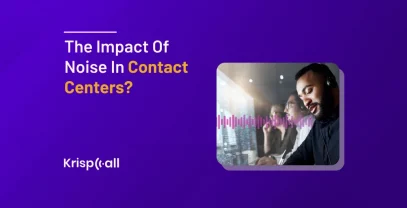Choosing the right VoIP provider can be challenging for your contact center. A contact center needs VoIP services for two main reasons: scalability and features.
Scalability is crucial because the number of workers in a contact center can fluctuate. Additionally, features offer solutions that increase the productivity within the contact center.
The future of contact centers depends upon the VoIP solution. It offers advanced features, security, and technical customer support, saving time and making work less frustrating.
This guide will explain why you need the right VoIP solution for your contact center.
🔑 Key Highlights
- VoIP technology allows people to make voice calls online rather than traditional telephone lines.
- Know what types of VoIP, including hosted PBX, on-premises, and cloud-based VoIP, are right for your call center.
- Reasons to choose the right VoIP solution for your contact center, including Integration and disaster recovery.
- Six significant factors to consider before choosing the right VoIP solution for a contact center, including free trial and demo.
What is a VoIP contact center?
A VoIP (Voice over Internet Protocol) contact center is a customer service that uses internet technology (Voice over Internet Protocol) to handle customer calls instead of depending on traditional phone lines. It converts voice calls into digital signals that travel over the internet without physical phone lines.
A VoIP system is affordable and offers several unique digital features. In conjunction with it, companies can add phone lines, conduct conferences, and set up mobile phone calls without incurring additional costs.
A VoIP service provider is a company that offers internet-based communication tools for making calls, video calls, and texting. With VoIP service providers, users no longer need to rely on wired telephone networks when making and receiving calls.
Find out what kind of phone system is right for your call center
Hosted PBX
It is a cloud-based phone system that provides businesses with reliable and secure phone services at an affordable price. It is powered by internet protocols (IP), which provide flexibility and constant connectivity. VoIP providers use hosted PBX systems to manage everything remotely. The Hosted PBX provider is in charge of managing its global network of data centers.
However, VoIP phone systems and providers transmit sound packets and other information needed for unified communication over the Internet, making calls possible.
On-Premises VoIP
An on-premise call center is physically located and has all the necessary equipment and software on company-owned servers. Contact center infrastructure requires all the equipment to make calls and remain in the building, ensuring the on-premises solution is reliable until hardware failure.
It is one of the safest choices due to its physical hardware requirement. There is less chance of hacking the entire system.
Cloud-Based VoIP
A cloud-based call center is a web-centric software platform for managing a company’s incoming and outgoing calls. Because cloud-based technology is hosted on the cloud, it does not require a physical location. A cloud-based call center requires high-quality internet bandwidth for a virtual agent to manage inbound and outgoing conversations.
On the other hand, cloud center providers establish, manage, and safeguard regulated telephony platform products on their servers, giving customers exclusive access via the internet on a subscription or as-needed basis.
8 Reasons to choose the right VoIP solution for your contact center

Cost saving
One of the significant advantages of getting a VoIP phone system is eliminating long-distance costs. While traditional phone services charge high rates for long-distance calls, VoIP uses the internet to send voices, no matter how far the participant’s location is.
Reduced manpower
VoIP offers features like interactive voice response (IVR) systems and chatbots. These features can handle inquiries and tasks, reducing human needs and minimizing manpower. Some also offer self-service options that allow customers to find answers and queries without a live agent.
Enhanced customer experience
VoIP offers features like voice calls, video calls, instant messaging, and more, making it easier for customers to reach out through their preferred method. It reduces wait times and makes quicker connections to qualified agents, which leads to more positive results. Similarly, VoIP offers 24/7 availability to improve the customer experience.
Integration capabilities
VoIP solution can integrate with your existing CRM and other business tools to create a single platform for managing all customer interactions. This eliminates the need to switch between different applications, which helps save agents time and effort. Integration improves productivity, streamlines operations, and provides a more efficient and unified communication system.
Disaster recovery
VoIP systems are cloud-based, so your calls and data are stored and managed off-site. This eliminates the risk of data loss or system failure due to hardware malfunctions or physical damage. These backup systems include redundant servers, alternative power sources like generators or batteries, and failover mechanisms that switch to backup connections or routes.
The goal of VoIP is to minimize downtown and ensure that businesses can continue to make and receive calls even in challenging situations.
Scalability
A scalable VoIP system is essential for maintaining efficient communication in your business, regardless of its complexity or scale. VoIP removes the need for costly, time-consuming setups and adjustments whenever your business expands or changes. Scalability is critical for keeping competitive, particularly regarding how your organization communicates. Success in today’s corporate environment depends on quick and efficient communication.
Easy setup and maintenance
One of VoIP technology’s most significant advantages is that it is pretty simple to manage. Installation takes only a few minutes and is very easy. Being tech-savvy is not necessary to manage your VoIP. With many web tools to optimize VoIP’s advantages, managing and operating your platform is a smooth sailing experience.
Advanced Features
VoIP provides advanced features unlike traditional systems, such as automatic call distribution, which distributes the call to the most qualified agent. Another advanced feature is IVR, which allows callers to navigate a menu of options using their voice. Some additional features are call recording, monitoring, and call analytics.
By leveraging these advanced features, VoIP solutions empower contact centers to operate more efficiently and deliver exceptional customer service.
Things to consider before choosing the right VoIP for your contact center

Total cost
Cost is the primary factor to consider when choosing a VoIP system. Fortunately, VoIP has more flexible pricing than landline phone systems. When selecting the right VoIP, almost all companies quickly discover that the plan suits their budget. But break down monthly vs. yearly costs, which might benefit your contact center. Don’t just focus on headline price; compare the features included in each plan and factor.
Flexibility
Does the service provider offer future scalability and flexibility? Consider the VoIP system that can easily add or remove users as your needs change. This flexibility can be crucial for attracting and retaining talent, especially in today’s work environment.
Number portability
Portability is crucial before choosing the right VoIP due to multiple factors, such as customer retention, professional image, and minimized disruption. If you’ve already got a phone number that people know and use to reach your business, it’s essential to keep it when switching to a new VoIP system. Imagine the frustration if customers reach out using the old number and can’t connect with your contact center.
Security and Compliance
Overall, VoIP is very secure. Still, contact centers need to be aware of various concerns, such as spam calls, call interception, and toll fraud. A reliable VoIP service provider like KrispCall will always follow high-level security measures to safeguard your data from potential interception or breach. Before choosing the right VoIP, ensure the provider has taken the necessary security measures following the security protocols.
Support and customer service
Think about the quality of customer service each VoIP company offers. Look for service providers who provide phone, email, live chat, and 24/7 support. A responsive and knowledgeable support team can save your organization downtime and help minimize issues quickly.
Free trial or demo
Almost all VoIP service providers offer free trial or demo. Take advantage of these opportunities to test the system and ensure it fits your requirements before committing.
Why is KrispCall the right VoIP solution for the contact center?
KrispCall offers cutting-edge features to improve your calling experience and reasonably priced, value-packed subscription rates.
One of KrispCall’s standout features is its advanced noise-cancellation technology, which improves call quality. This means agents can focus more on the conversation without any disturbances. Also, KrispCall is designed to meet the contact center’s needs and easily adapts to accommodate changes.
KrispCall provides the most reliable, high-quality VoIP services with 24/7 human assistance and innovative features for your contact center. It is trusted by clients all over the world. From crystal-clear voice calls to seamless integration with daily life, every aspect is tailored to exceed your expectations.
KrispCall Features
- Global Calling: Place calls to international numbers without any geographical difficulties.
- Call log history: Keeps records of your incoming and outgoing calls to track your communication
- Call forwarding: You can redirect incoming calls to other chosen numbers so you never miss an important call, even when you are away from home.
- Multimedia Messaging: Send and receive multimedia content, including text messages, photos, videos, and phone calls.
- Unified Callbox: Access all of your contacts, conversations, and features from a single, simple interface.
Conclusion
Consider price, customer service, and features when choosing a VoIP provider. These three are the main factors for the growth of your contact center. While cost is essential, it should not be the only determining factor. Consider the VoIP provider’s value rather than just the first cost.
Even with multiple features, it’s a good idea to focus on the important ones that suit your business. Good service is essential, but it’s also important to check the company’s customer service.
While choosing the best VoIP for your contact center, consider the price, the features you need, and the customer service. Consider these things carefully to ensure you choose the right one for your business’s growth.
Faq
What is the difference between a VoIP phone and a regular phone?
The fundamental difference between VoIP and standard phone numbers is the technology used to operate both systems. While traditional phones use specifically designed physical wiring networks to carry voice signals, VoIP transmits information via the Internet. The voice signal is converted into digital data packets and sent online.
How much does it cost to use a VoIP phone?
It depends on the service provider you choose. However, the costs start at $15 monthly and go up to $60 monthly. However, various factors significantly impact VoIP phone costs, including the provider, features, and plan pricing.
Do I need to buy a particular phone for VoIP?
You do not need any particular phone for VoIP services. VoIP is designed to work on the Internet. Many VoIP services work with existing devices like smartphones, computers, or tablets. You can download a VoIP app to make and receive calls.
Why are people switching to VoIP phones?
People are switching to VoIP phones for several reasons. One primary reason is that it saves a lot of costs, especially during international calls. VoIP offers features like unified communication, call forwarding, global calling, phone tree (IVR), and many more. VoIP systems can work smoothly with multiple business systems and apps, including CRM platforms, email clients, and productivity tools.





